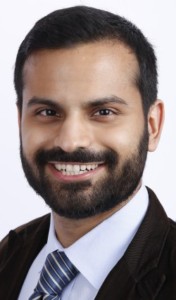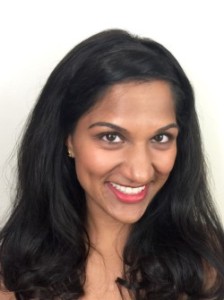BOSTON—Ten South Asians have made to the list of 40 Under 40 healthcare innovators published by MedTech Boston, a publication covering health care and medical technology industry locally.
Included in the list are: Suman Bose, PhD, Anshuman Das, PhD, Shaan Gandhi, MD, Ketki Karanam, PhD, Ali Khan, MD, MPP, Jay Kumar, Maulik Majmudar, MD , Alia Rashid, MD, Neel Shah, MD, MPP and Nina Vasan, MD.
“We’re incredibly excited to announce the winners of the 2016 MedTech Boston 40 Under 40 Healthcare Innovators from Boston and beyond. Our list includes physicians, entrepreneurs, policy makers, students and more—but the key is that they’re all committed to changing our healthcare system for the better,” said MedTech Boston.
This is what MedTech Boston said about these innovators:
Suman Bose, Co-Inventor IllumiRNA, Post-doctoral Fellow at MIT
In April of this year, the Koch Institute awarded $300,000 to IllumiRNA, an early stage leukemia diagnostics platform, as part of their “Shark Tank” style pitch-off competition for early cancer detection technology.
Suman Bose, a postdoctoral researcher working as a JDRF Fellow in the lab of Drs. Robert Langer and Daniel Anderson, was one of the initial members of the team. Bose’s interest in microfluidics and diagnostics began in while he was studying for his PhD in mechanical engineering at MIT, where he developed two novel microfluidic platforms for isolating and analyzing diseased cells from blood.
Anshuman Das, Postdoctoral Associate at Massachusetts Institute of Technology
After completing his dissertation on novel applications of photonic principles in improving the efficiencies of organic solar cells, Dr. Anshuman Das began looking for postdoctoral positions. It was then that he met Dr. Ramesh Raskar, associate professor at the MIT Media Lab, and that his career as a healthcare innovator began.
Raskar asked Das if he would be interested in applying his expertise to the field of healthcare. “I didn’t think twice!” says Das of his decision to pursue healthcare innovation. “Somehow, I felt that the greatest utilization of my research and problem solving skills was in healthcare.”
Shaan Gandhi, Resident Physician in Internal Medicine at MGH, CMO at Wellable
Shaan Gandhi was drawn to healthcare because he wanted to change lives and to create value on a global scale. He recalls a former professor advising him to think of his career as a path on which he must align his skills, experiences and background. “The better the alignment, the more value I can create, and the stronger I can establish myself in that career path,” he says.
Gandhi believes healthcare is trending towards greater emphasis on return on investment.
“Entrepreneurs who have the foresight to collect and analyze data to prove their return on investment of their services will win,” adds Gandhi. Moreover, as healthcare transitions more to outpatient settings, building devices that collect continuous information will become pivotal in supporting recovery.
Ketki Karanam, PhD, Senior Associate at PureTech, Co-founder & Head of Science at the Sync Project
Growing up in India, Ketki Karanam was fascinated by both biology and computer science. She chose to study biology, but her latest venture, The Sync Project, has allowed her to pursue both fields.
“It’s almost coming full circle – being able to work with computer scientists and applying technology to health care even though my choice long ago was to enter medicine,” says Karanam. “I’m glad both my worlds are coming together now at this stage.”
Ali Khan, MD, MPP, Incoming Regional Medical Officer at CareMore, Faculty at Yale Medicine
A former print journalist, Dr. Ali Khan believes that human stories are central to the practice of medicine. “Clinical models are designed to hear those stories, to give them the time and space they deserve and to then connect those narratives with the tools, interventions and supports necessary to elevate them,” says Khan. “I went into journalism with the intent of learning those stories; I went into medicine and policy to help solve them.”
Khan’s own story, the journey of a primary healthcare innovator on a mission to advance the human right to health, is filled with impressive milestones. Khan has held positions of leadership at the American College of Physicians, Doctors for America, Physicians for Human Rights and most recently Iora Health, a mission-driven primary care and technology company.
Jay Kumar, MD/MBA Candidate at Harvard University, Co-Founder at Astraeus Technologies

Growing up in Oklahoma, Jay Kumar became aware of the many inadequacies of the healthcare system in America.
“While it is arguably the most advanced healthcare system in the world, it is also expensive and inefficient,” he says. “I’m optimistic that bringing together the fields of medicine, business, and technology can result in innovations that will transform American and global healthcare.”
Kumar is joining an emerging generation of healthcare leaders committed to reducing costs and improving the quality of health care. As a student in the joint-degree, MD/MBA program at Harvard, he’s learning the craft of medicine as well as the principles of business systems and organizational behavior. He plans to use his position as a practicing physician to identify areas for improvement and his understanding of organizations to develop effective solutions.
Maulik Majmudar, MD , Cardiologist and Associate Director of the Healthcare Transformation Lab at MGH, Co-Founder at Quanttus
Maulik Majmudar’s college years set him up perfectly for a career in medicine. A biochemistry and neurophysiology major at the University of Maryland College Park, Majmudar also worked as a paramedic and athletic trainer on his school’s football team. But it wasn’t until after graduation, when Majmudar began working as a clinical researcher at the Johns Hopkins Hospital ED, that he fell in love with medicine. “I was hooked. I absolutely loved the fast-paced, intellectually challenging, and dynamic environment,” he says of his realization.
Dr. Majmudar went on to receive his MD from Northwestern University’s Feinberg School of Medicine, and completed his residency in Internal Medicine at Johns Hopkins Hospital. A post-doc fellowship in cardiovascular medicine at Brigham & Women’s Hospital brought Majmudar to Boston, where he eventually joined the faculty at Massachusetts General Hospital as a cardiologist and as a co-director of the hospital’s digital health innovation lab.
Alia Rashid, MD, Medical Director at Annexon Biosciences
Alia Rashid concentrates on immune modulation in neurodegenerative diseases. Rashid realized the importance of leveraging technology to revolutionize healthcare after attending the Exponential Medicine Conference, which inspired her to improve the quality of data and precision of markers.
Rashid believes that there is important work to be done at the intersection of biotechnology and digital health innovation. “These insights have allowed me to understand the issues and constraints around developing life-saving therapies, as well as giving me the opportunity to understand how technology can be utilized to provide more personalized and effective healthcare,” says Rashid.
Neel Shah, MD, MPP, Founder at Cost of Care, Associate Faculty at Ariadne Labs
Neel Shah knew he wanted to be a doctor from the time he was 18 years old. As a medical student he was inspired by his capacity to help others as a doctor; however, it was also during his training that he encountered a problem he couldn’t ignore. “There was one consistent health system failure that I found particularly striking,” says Shah. “Even though we were providing the most expensive services that most Americans will spend money on in their lifetime, nobody could tell anyone what anything costs.”
Shah took a leave of absence to study the economics of the healthcare system at the Harvard Kennedy School of Government. He found that economists and policymakers didn’t know how healthcare was actually delivered.“I decided that in my career as a clinician, I wanted to find ways to bridge this gap,” Shah says.
Shah went on to write “Understanding Value-Based Healthcare” to help clinicians understand how to care for patients in an era of value-based care, and co-found Costs of Care, a global NGO that aims to find ways to deliver better healthcare at a lower cost. “We achieve this mission through advocacy—building coalitions, strategically timing and framing core messages,” he says.
Nina Vasan, MD, Psychiatry Resident Physician at Stanford, Co-Author of “Do Good Well,” Advisor at Lyra Health

Nina Vasan, MDEver since childhood, Dr. Nina Vasan believed that she could empower herself and her community through service in healthcare. In high school she launched American Cancer Society Teens, a nationwide network that encouraged youth volunteers to find creative solutions for improving health in their communities. In her adult life she has worked in the Director-General’s office at the WHO, co-chaired health care outreach to battleground states for Obama’s presidential campaign, and spearheaded a grassroots movement to advocate for the direction of Master Tobacco Settlement funds toward public programs.
But it was in medical school that Vasan found her calling as a mental health care innovator. While a medical student, Vasan was diagnosed with depression, and made the deliberate decision to be outspoken about her diagnosis. “Reactions were bifurcated,” says Vasan. Some of her peers applauded her decision and provided emotional support. “However, the more common response, including from my academic advisors, was to keep quiet about having a mental illness and to expunge my record of any evidence of a psychiatric diagnosis,” she says.
















